How Much Does it Cost to Build a Sunroom?
The cost range for building a three-season room typically falls between $13,000 and $52,000, with the average cost landing around $32,500. This estimate covers a variety of sunroom styles, ranging from simple home additions to more elaborate structures. A three-season room offers a cozy space that lets you enjoy the outdoors in spring, summer, and fall without worrying about bugs or the weather.
For those looking to expand their living space even further, a four-season sunroom is an excellent option.
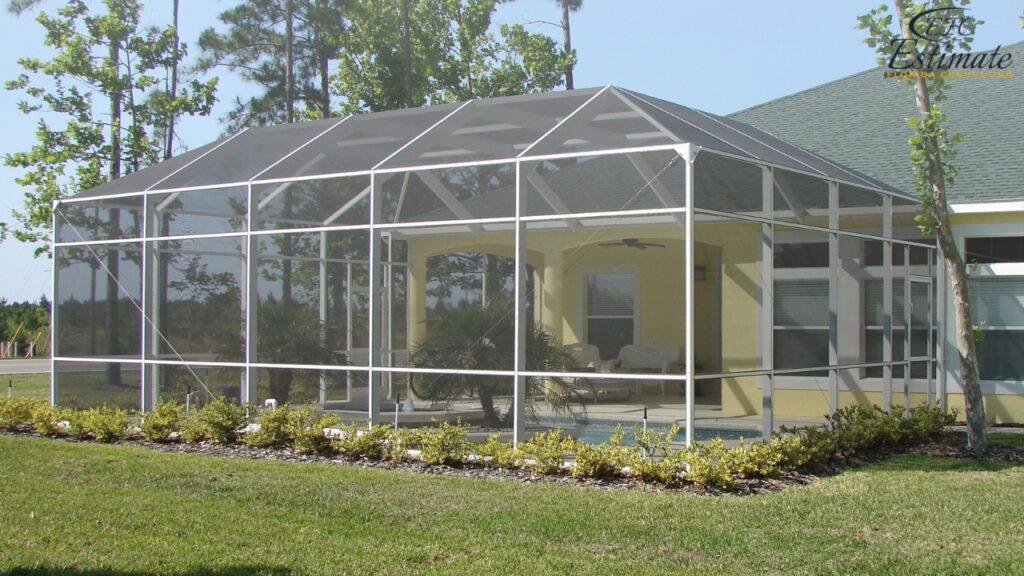
This addition is fully insulated and often includes essential features like plumbing, HVAC systems, and electricity, making it a comfortable space to use year-round. With the added convenience of these amenities, a four-season sunroom offers the perfect blend of indoor comfort and outdoor charm, allowing you to enjoy your surroundings no matter the season.
Cost Breakdown for Sunroom Additions
Three-Season Room Cost
Cost Range | Details |
Average Cost | $32,500 |
Highest Cost | $58,500 |
Lowest Cost | $14,300 |
A three-season room offers a wonderful way to extend your living space, providing a comfortable area to enjoy the outdoors without dealing with insects or harsh weather. This type of room is ideal for spring, summer, and fall, making it a versatile and affordable home addition.
Four-Season Room Cost
Cost Range | Details |
Average Cost | $58,500 |
Highest Cost | $110,500 |
Lowest Cost | $32,500 |
A four-season room is a year-round retreat, fully insulated and equipped with plumbing, HVAC systems, and electricity. This addition enhances your home’s functionality, providing a cozy and inviting space to enjoy no matter the season. Whether for relaxation, entertainment, or as an extension of your living area, a four-season room adds significant value and comfort to your home.
Get Acquainted with Sunroom
Sunroom Construction
Sunroom Construction
Sunroom Construction
Sunroom Cost Per Square Foot
When planning for a sunroom addition, understanding the cost per square foot is essential. On average, a three-season sunroom can cost between $97.50 and $325 per square foot, while a fully insulated four-season room ranges from $286 to $585 per square foot. These costs include both labor and materials, ensuring you have a clear picture of what to expect.
Always ask your contractor for a detailed breakdown of the per-square-foot rate to understand what is included in your quote, so there are no surprises along the way. Knowing the full scope of what you’re paying for is crucial to making informed decisions.
Square Footage | 3-Season Sunroom Cost | 4-Season Sunroom Cost |
8 x 8 (64 sq ft) | $6,656 – $19,136 | $16,640 – $33,280 |
10 x 10 (100 sq ft) | $10,400 – $29,900 | $26,000 – $52,000 |
14 x 14 (196 sq ft) | $20,384 – $58,604 | $50,960 – $101,920 |
20 x 20 (400 sq ft) | $41,600 – $119,600 | $104,000 – $208,000 |
Sunroom Costs by Type
When considering adding a sunroom to your home, it’s essential to understand the different types available and their associated costs. Whether you’re looking for a simple space to enjoy the outdoors or a luxurious extension of your living area, each sunroom type offers unique features and benefits tailored to various needs and preferences.
Prefab Sunroom
Prefab sunrooms, often constructed from durable materials like aluminum or vinyl, are a cost-effective solution for homeowners seeking a quick and easy addition. These prefabricated sunrooms are generally less expensive than traditional custom-built options, making them a popular choice for budget-conscious individuals. You can expect to pay between $7,150 and $42,900 for the installation and kit cost of a prefab sunroom. This option provides a practical and affordable way to extend your living space and enjoy the benefits of natural light and outdoor views without breaking the bank.
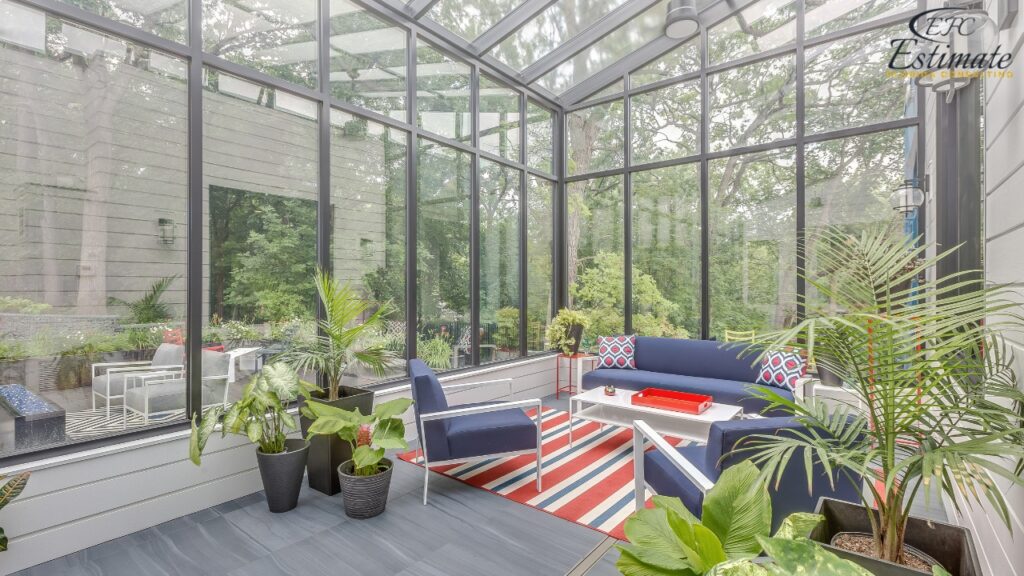
Three-Season Sunroom
Three-season sunrooms are ideal for those who love to bask in the beauty of nature during mild weather conditions. These sunrooms are designed for use in spring, summer, and fall, offering a comfortable space to relax without the need for heating or cooling. With costs ranging between $14,300 and $58,500, three-season sunrooms are more affordable than four-season options. However, they typically lack insulation, electricity, and HVAC systems, making them less suitable for year-round use. Despite this, a three-season sunroom is a fantastic way to add value to your home while creating a cozy retreat for enjoying the outdoors.
Four-Season Sunroom
For homeowners who desire a versatile space that can be used throughout the year, a four-season sunroom is the perfect solution. These fully insulated sunrooms often include essential features such as HVAC systems, electrical outlets, and advanced wiring, ensuring comfort regardless of the season. The cost for a four-season sunroom addition ranges from $32,500 to $110,500, depending on the level of customization and the specific features chosen. A four-season sunroom not only increases your home’s functionality but also enhances its resale value by providing an all-weather living space that seamlessly blends indoor comfort with outdoor beauty.
Solarium
A solarium is a stunning, fully-enclosed glass room that allows you to immerse yourself in natural light while staying protected from the elements. While solariums typically don’t include insulation, climate control, or electrical outlets, they offer a unique space for sun-loving plants and an unobstructed view of the outdoors. On average, a full solarium installation will cost between $39,000 and $104,000. This type of sunroom is perfect for those who want to create a bright, airy space that blurs the lines between indoor and outdoor living, providing a serene environment for relaxation or gardening.
Conservatory
Conservatories are luxurious all-glass rooms that combine the elegance of traditional design with modern amenities like HVAC systems and electrical outlets. These elaborate structures are perfect for homeowners seeking a high-end addition that offers both beauty and functionality. With costs ranging from $65,000 to $201,500, conservatories are an investment in your home’s future, providing a year-round retreat that enhances your living space and increases your property’s value. A conservatory is ideal for those who want to enjoy panoramic views of their garden while staying comfortable in any weather.
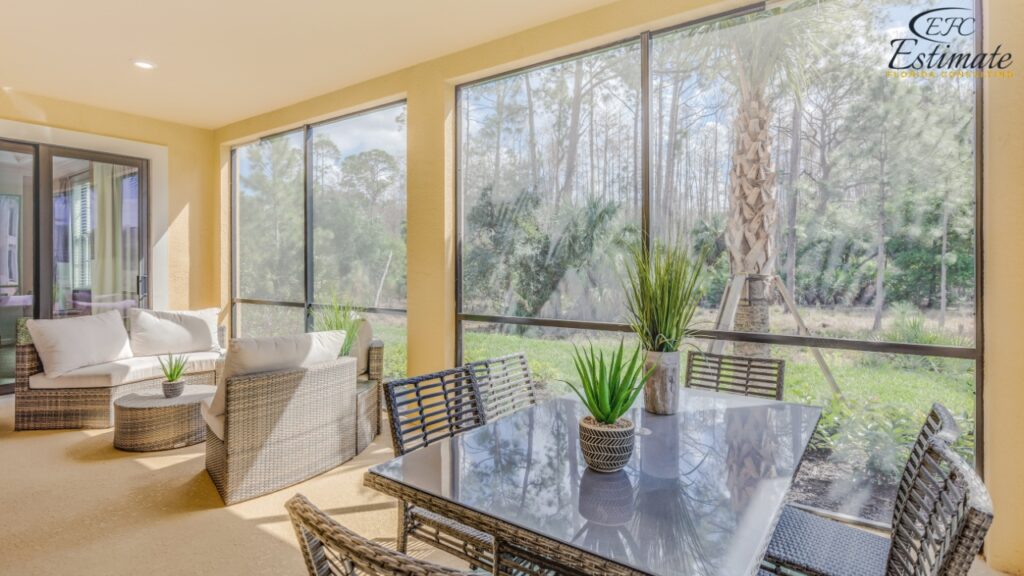
Atrium
Atriums are indoor rooms featuring an all-glass roof, allowing natural light to flood the space and creating a connection between your home and the outdoors. The cost of an atrium ranges from $9,100 to $32,500, depending on factors such as roof work, size, and the complexity of integrating the atrium with your existing home structure. Atriums are a unique way to bring the beauty of the outdoors inside, offering a peaceful, light-filled space that can be used for various purposes, from a relaxing lounge area to a vibrant indoor garden.
Sunroom Costs by Type
When planning to add a sunroom to your home, understanding the costs associated with different types of sunrooms is crucial. From materials to installation, each type of sunroom offers unique benefits and pricing that cater to various needs and budgets.
Sunroom Type | Sunroom Materials Cost | Sunroom Installation Cost | Total Cost |
Three-Season | $6,500 – $39,000 | $6,500 – $13,000 | $13,000 – $52,000 |
Four-Season | $19,500 – $78,000 | $13,000 – $26,000 | $32,500 – $104,000 |
Solarium | $26,000 – $65,000 | $13,000 – $32,500 | $39,000 – $97,500 |
Conservatory | $3,900 – $78,000 | $2,600 – $26,000 | $6,500 – $104,000 |
Atrium | $5,200 – $26,000 | $7,800 – $19,500 | $13,000 – $45,500 |
90% More Chances to Win Projects With Our Estimate!
- Multi-Family Building
- Hotel Building
- Hospital Building
- Warehouse Building
- School & University Building
- High-Rise Building
- Shopping Complex
- Data Center Building

Sunroom Installation Cost
When planning to add a sunroom, it’s essential to consider the installation costs, which generally account for one-half to one-third of the material expenses. However, these costs can quickly escalate if your project includes additional elements such as HVAC systems, roofing, or electrical work. This is why the installation cost for an atrium can be significantly higher compared to a simpler three-season room, where such extensive work isn’t required.
A good range to expect for sunroom labor costs is between $6,500 and $26,000, depending on the complexity and scope of your project.
Factors Influencing Sunroom Installation Costs
When planning to add a sunroom to your home, understanding the various factors that influence installation costs is crucial. The cost of a sunroom can vary significantly based on the size of the project, the quality of materials used, and the type of sunroom you select. Each of these elements plays a vital role in determining the final price, so it’s important to consider them carefully during the planning and budgeting stages.
Size of the Sunroom
The size of your sunroom is a major factor that directly impacts the overall cost of the installation. Larger sunrooms require more building materials, such as glass, framing, and insulation, as well as more labor hours, which increases the total cost. Generally, the cost to install a sunroom can range from $169 to $429 per square foot, depending on factors like design complexity and material quality. When planning your sunroom, consider not only how much space you want to add but also how that space will be used—whether for entertaining, relaxing, or as a home office—as this will influence both the size and cost of the project.
Quality of Materials
The quality of materials used in your sunroom construction is another significant factor affecting both the cost and longevity of the project. High-quality materials often come with a higher initial cost but can lead to long-term savings through reduced maintenance and improved energy efficiency. For instance:
Vinyl Sunrooms
If you’re looking for a cost-effective, low-maintenance option, vinyl is an excellent choice. Vinyl sunrooms are durable, energy-efficient, and available in a wide range of styles and colors, making them a versatile option for homeowners. Vinyl’s affordability, combined with its resistance to weathering and pests, makes it a popular choice for budget-conscious homeowners who still want a stylish and functional sunroom.
Wood Sunrooms
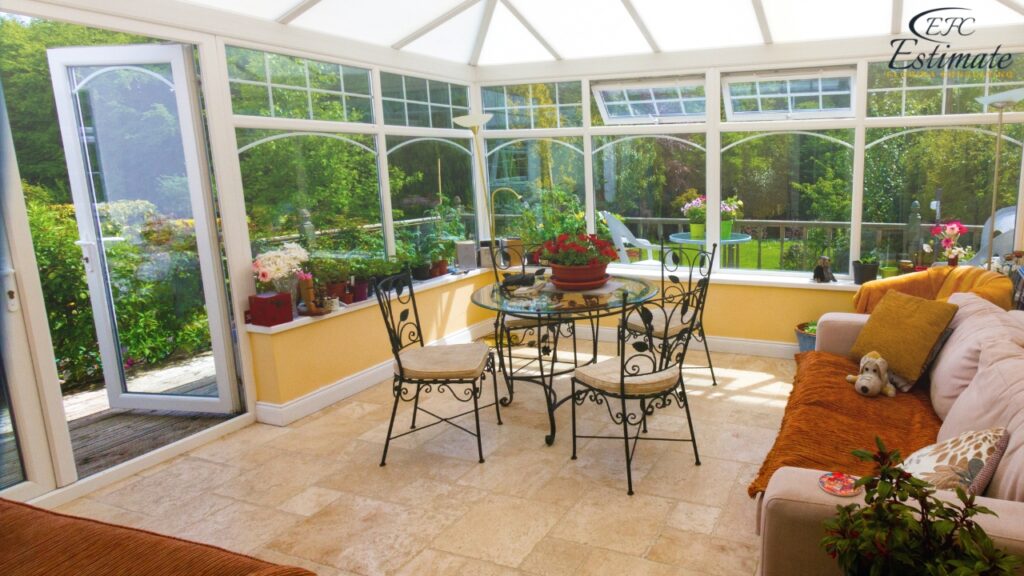
For those who prefer a more traditional, warm aesthetic, wood is a timeless material that offers natural insulation benefits. Wood sunrooms, while more expensive upfront, can save on heating and cooling costs due to wood’s insulating properties. The rich, natural look of wood can add a touch of elegance and sophistication to your sunroom, creating a cozy and inviting space that blends seamlessly with the rest of your home.
Type of Sunroom
The type of sunroom you choose will have a significant impact on the overall cost of the project. Sunrooms come in various designs, each offering unique features, benefits, and price points. It’s essential to choose a sunroom type that fits both your budget and your desired use of the space. Here are some options to consider:
Atrium Sunrooms
An atrium sunroom features a stunning glass ceiling that allows natural sunlight to flood the space, creating a bright, open atmosphere. Atriums are ideal for those who want a unique, airy space that feels connected to the outdoors. However, the complex design and specialized materials required for an atrium can make this type of sunroom more expensive to install.
Conservatories and Garden Rooms
Conservatories and garden rooms are typically attached to the home and feature large windows that let in ample natural light. These rooms are perfect for enjoying views of your garden year-round. The luxurious design and high-quality materials often used in conservatories can drive up the cost, making them a more premium option for homeowners looking to add a touch of elegance to their property.
Glass Solariums
Solariums are constructed entirely of glass, offering panoramic views of your yard and allowing you to enjoy the beauty of the outdoors from the comfort of your home. The extensive use of glass in solariums makes them one of the more expensive sunroom options, but the benefits of unobstructed views and abundant natural light make the investment worthwhile for many homeowners.
Three-Season Sunrooms
Three-season sunrooms are designed for use during spring, summer, and fall, making them a more budget-friendly option. These rooms extend your living space but lack the additional insulation and heating needed for year-round use. Three-season sunrooms are ideal for homeowners who want to enjoy the outdoors without exposure to the elements but don’t require the full functionality of a four-season room.
Four-Season Sunrooms
Unlike three-season sunrooms, four-season sunrooms are fully insulated and equipped with heating and cooling systems, allowing for year-round use. These sunrooms provide a comfortable space to relax, entertain, or even work, regardless of the weather outside. The added features and insulation in four-season sunrooms contribute to higher installation costs, but they offer the versatility and comfort that many homeowners desire.
How to Build a Sunroom in Your Home
Building a sunroom can be a rewarding home improvement project, offering additional living space and a beautiful connection to the outdoors. If you have experience with home improvement tasks, constructing a sunroom is a complex but manageable endeavor. However, it requires careful planning, attention to detail, and a clear understanding of the steps involved. Here’s a step-by-step guide to help you navigate the process:
Secure Your Permits
Before you begin any construction, it’s essential to secure the necessary permits from your local building authority. This step is crucial to ensure that your sunroom complies with local building codes and regulations. Failing to obtain the proper permits can result in hefty fines or, in the worst-case scenario, being required to dismantle your sunroom after it’s built. The permitting process might add to your initial costs, but it’s a necessary investment to avoid legal complications down the road.
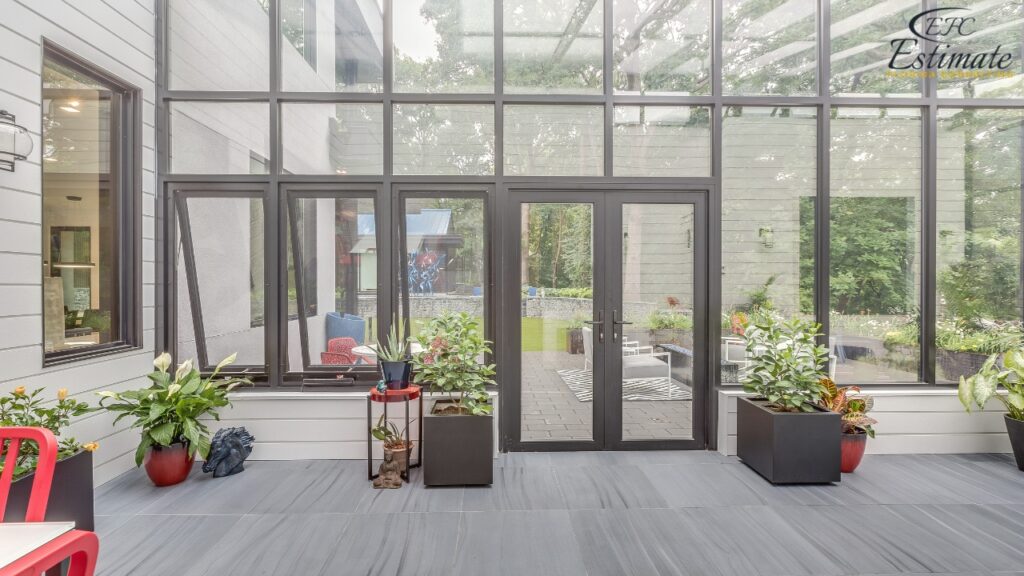
Lay the Groundwork
Once you have your permits in hand, the next step is to prepare the site for construction. This involves clearing the area of any debris, removing existing structures, and leveling the ground. After the site is ready, you’ll need to lay a strong foundation and construct the frame of the sunroom. A solid foundation is crucial for the long-term stability of your sunroom, ensuring it remains sturdy and secure for years to come. Depending on the size and complexity of the project, this step can be labor-intensive and may require professional assistance to ensure the foundation is properly laid and the frame is accurately built.
Add Windows, Doors, and a Roof
With the frame in place, it’s time to install the windows, doors, and roof. Your choice of materials will largely depend on whether you’re building a three-season or four-season sunroom. For a three-season sunroom, you might opt for less insulated windows and a simpler roof structure. However, if you want a four-season sunroom that’s usable year-round, you’ll need to invest in energy-efficient windows, insulated doors, and a durable roof that can withstand various weather conditions. The cost of these materials can vary widely, so it’s important to budget accordingly and choose options that meet your needs and climate requirements.
Insulate and Wire
To ensure your sunroom is comfortable during the colder months, insulation is a must. Proper insulation will help maintain a stable temperature, reduce energy costs, and enhance the overall comfort of the space. After insulating the walls, ceiling, and floor, you’ll need to run electrical wiring for lighting, outlets, and possibly heating and cooling systems. This is a critical phase of the project that requires the expertise of licensed electricians and HVAC professionals. While this adds to the overall cost, professional installation ensures that your sunroom is safe, energy-efficient, and compliant with building codes.
Finish with Flooring and Décor
Now comes the exciting part—adding the finishing touches to your sunroom. Start by choosing a flooring material that complements the style of your home and meets your needs. Whether you prefer hardwood, tile, or luxury vinyl, the right flooring can enhance the aesthetic appeal and functionality of the space. Next, paint the walls with a color that reflects your personality and style. Finally, add your favorite home décor items, such as comfortable furniture, cozy rugs, and plenty of plants, to create a welcoming atmosphere. This is where your sunroom truly comes to life, transforming into a space where you can relax, entertain, or simply enjoy the beauty of the outdoors.
Partner with Professional Builders
If the prospect of building a sunroom from scratch feels overwhelming, or if you’re not confident in your construction skills, partnering with professional builders is a wise choice. Experienced contractors can handle the most challenging and technical aspects of the project, ensuring that your sunroom is built to the highest standards. Hiring professionals but the peace of mind that comes with knowing your sunroom is structurally sound and compliant with all regulations is invaluable. Professional builders can also help streamline the construction process, saving you time and preventing costly mistakes.
Download Template For Sunroom Project Breakdown
- Materials list updated to the zip code
- Fast delivery
- Data base of general contractors and sub-contractors
- Local estimators

Additional Sunroom Cost Factors
When planning to add a sunroom to your home, it’s essential to consider various factors that can significantly influence the final price tag. From construction permits to site preparation and interior finishing, each element plays a critical role in determining the overall cost of your sunroom project. Let’s dive into the key factors that can impact your sunroom budget.
Permits and Insurance
Securing the proper building permits is a crucial first step in any home addition, including sunrooms. Permits ensure that your project complies with local building codes and meets all necessary insurance requirements. The cost of obtaining a permit typically ranges from $520 to $1,950, depending on your location and the complexity of the project. The permitting process can take anywhere from two to eight weeks, so it’s important to factor this timeline into your planning. Additionally, if you’re working with a licensed general contractor, ensure they are fully insured. For DIY enthusiasts, it’s wise to contact your insurance agent to add construction coverage, protecting your materials, subcontractors, and your entire home during the build.
Site Preparation
Proper site preparation is essential for laying the groundwork for your sunroom. If there’s no existing foundation, you can expect to pay between $650 and $7,280 to clear the land and prepare the construction site. This includes removing any obstacles, such as trees or old structures. Tree removal costs approximately $910 per tree, while land excavation can range from $1,690 to $5,980, depending on the scope of work. Preparing the site correctly is vital for ensuring a stable foundation and smooth construction process.
Foundation
The foundation is the backbone of your sunroom, providing the necessary support for the entire structure. Pouring a new foundation typically costs between $1,300 and $7,800, depending on the size and type of foundation required. A solid foundation is essential for the long-term durability of your sunroom, ensuring it remains level and secure for years to come.
Insulation
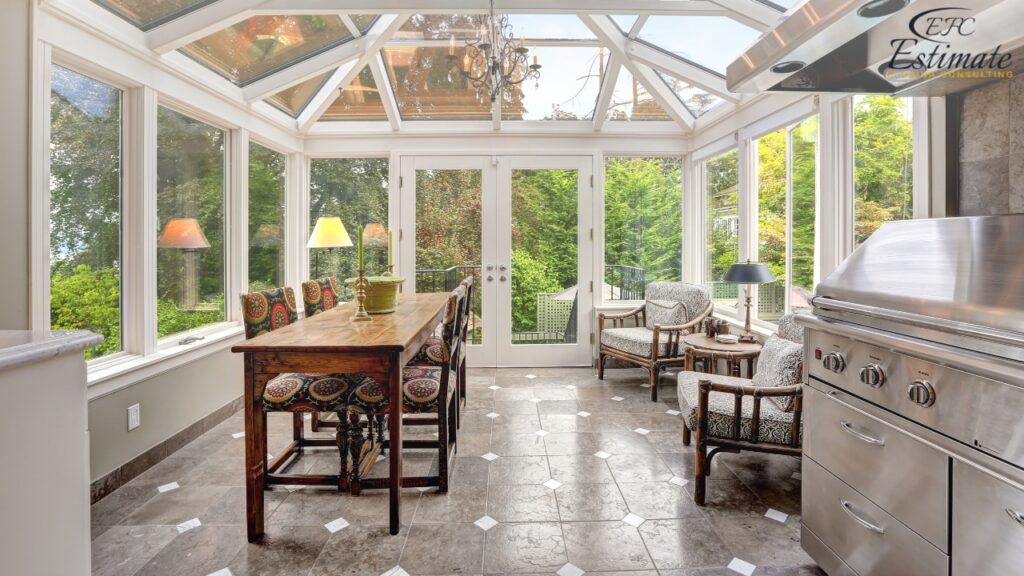
Insulation is a key component in creating a comfortable and energy-efficient sunroom, especially if you’re building a four-season room. Insulation costs generally range from $650 to $1,950, depending on the materials used and the square footage of the room. Proper insulation is crucial for maintaining a stable temperature in your sunroom, reducing energy costs, and ensuring year-round usability. While insulation adds to the overall expense, it’s a necessary investment for creating a functional and comfortable space.
Doors
Installing doors in your sunroom adds both functionality and style, allowing easy access to your garden or patio. Patio door installation typically costs between $1,690 and $14,300, including labor and the door unit itself. While a three-season sunroom may require fewer doors, a four-season sunroom benefits from additional outside access for improved ventilation and ease of use. Choosing the right doors enhances the overall design of your sunroom and provides a seamless connection to the outdoors.
Heating and Air Conditioning (HVAC) Systems
To enjoy your sunroom year-round, you’ll need to consider heating and air conditioning options. Adding HVAC systems to your sunroom can range from $2,990 to $26,650, depending on whether you’re expanding existing ductwork or installing a new ductless mini-split system. While less expensive options, such as window air conditioning units and space heaters, are available, they can significantly increase your utility bills over time. Investing in a proper HVAC system ensures that your sunroom remains comfortable and energy-efficient throughout the year.
Interior Finishing
Interior finishing is where your sunroom truly comes to life, transforming it from a basic structure into a stylish and functional living space. Finishes can vary widely in cost, ranging from $260 to $11,700, depending on your design preferences and the materials you choose. Flooring options typically cost between $1,950 and $5,590, while painting the walls can add another $2.60 to $7.80 per square foot. Thoughtful planning and early shopping can help you find deals on furniture and décor, allowing you to create a beautiful sunroom without exceeding your budget.
Cleanup
Construction cleanup is an often-overlooked aspect of building a sunroom. If you’re working with a general contractor, the cleanup cost is usually included in the overall project price. However, if you’re handling the cleanup yourself or hiring a separate crew, expect to pay an additional $364 to $870. Renting a dumpster and arranging haul-away services typically costs around $390 to $683. Proper cleanup ensures that your new sunroom is ready for immediate use, free of debris and construction waste.
Landscaping
Adding the finishing touches with landscaping can greatly enhance the appearance and functionality of your sunroom. Landscaping costs usually range from $1,820 to $7,150, depending on the extent of the work and the plants or features you choose. Thoughtful landscaping can create a seamless transition between your sunroom and the surrounding outdoor space, making it an inviting and beautiful addition to your home.
DIY Building a Sunroom vs. Hiring a Professional: Which Is Right for You?
Adding a sunroom to your home is a fantastic way to enhance your living space, increase your property’s value, and create a cozy spot to enjoy natural light and outdoor views. However, building a sunroom can be a significant investment, and you have two primary options: hiring a professional contractor or taking the DIY route. While DIY building may seem like a more cost-effective option, there are several important factors to consider before you take on this project yourself, such as the time commitment, required materials, and the specific expertise needed to ensure a successful build. If you’re unsure whether you have the necessary skills or experience, hiring a professional may be the best way to ensure your sunroom is constructed efficiently, effectively, and up to code.
How to Save Money on Sunroom Addition Costs
Adding a sunroom to your home is an exciting project, but it can also be a significant financial investment. Fortunately, there are plenty of creative ways to keep costs within your budget without sacrificing quality or style. Whether you’re looking to create a cozy three-season room or a luxurious four-season retreat, these tips will help you save money on your sunroom addition while still achieving your dream space.
Consider Prefab Sunroom Designs
One of the most cost-effective ways to build a sunroom is by opting for prefab sunroom designs. Prefabricated sunrooms are built off-site and assembled at your home, reducing labor costs and construction time. These designs come in various styles and sizes, allowing you to choose a model that fits your budget and aesthetic preferences. Prefab sunrooms are an excellent option for homeowners looking to save money while still adding a functional and beautiful space to their home.
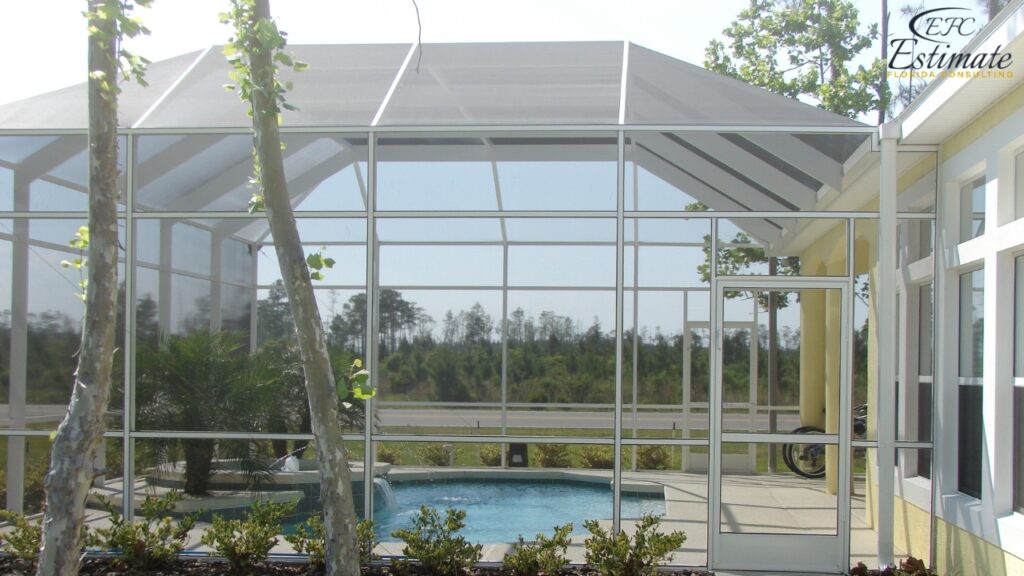
Turn an Existing Space into a Sunroom
Another smart way to save money is by converting an existing space, such as a porch or patio, into a sunroom. By utilizing the existing structure, you can significantly reduce the cost of building a new foundation and walls. This approach allows you to create a sunroom with minimal construction work, making it a budget-friendly option. Additionally, converting an existing space can be quicker and less disruptive than building a sunroom from scratch, allowing you to enjoy your new space sooner.
Opt for a Smaller Space
When it comes to sunrooms, size matters—especially when you’re on a budget. Opting for a smaller sunroom can help you save on materials, labor, and ongoing maintenance costs. A smaller space doesn’t mean sacrificing comfort or style; it simply means making the most of the area you have. By carefully planning your layout and choosing multipurpose furniture, you can create a cozy and functional sunroom that feels spacious without the high price tag.
Choose a Three-Season Sunroom to Cut Costs
If year-round use isn’t a priority, consider building a three-season sunroom. Three-season sunrooms are designed for use during spring, summer, and fall, eliminating the need for insulation and expensive HVAC systems. By cutting out these additional features, you can save a significant amount of money on construction and ongoing energy costs. A three-season sunroom is an ideal solution for homeowners who want to enjoy the outdoors without the expense of a fully insulated, climate-controlled space.
Explore Low-Cost HVAC Options
For those who want to use their sunroom during colder months, consider low-cost HVAC options such as mini-split systems. Mini-splits are energy-efficient, easy to install, and can provide both heating and cooling without the need for extensive ductwork. This option can save you money compared to traditional HVAC systems while still ensuring your sunroom remains comfortable throughout the year. Additionally, mini-splits offer flexibility, allowing you to control the temperature in your sunroom independently from the rest of your home.
Consider a Conservatory or Garden Room Over a Solarium
If you’re looking for a sunroom that offers a beautiful connection to the outdoors without the high cost of a solarium, consider a conservatory or garden room. These spaces typically feature large windows that let in plenty of natural light, creating a bright and airy atmosphere. While solariums are entirely made of glass and can be more expensive, conservatories and garden rooms offer a similar experience at a lower cost. These options are perfect for homeowners who want to enjoy their garden views without breaking the bank.
Compare Estimates from Multiple Designers
Before starting your sunroom project, it’s essential to speak with at least three designers or contractors to compare estimates. Each professional may offer different ideas, materials, and pricing, giving you a better understanding of your options. By comparing estimates, you can find the best value for your budget while ensuring you’re getting high-quality workmanship. This step is crucial for making informed decisions and avoiding unexpected expenses down the line.
Maintain a Flexible Timeline
Sticking to a flexible timeline can also help you save money on your sunroom addition. Contractors often have access to discounted materials or can find better deals when they have more time to shop around. By allowing some flexibility in your project’s schedule, you give your contractor the opportunity to secure low-cost materials and reduce overall costs. Additionally, a flexible timeline can help avoid rush fees or penalties for delays, further keeping your budget in check.
Consider Long-Term Savings
When planning your sunroom, it’s important to think about long-term costs and how you can save money over time. Investing in energy-efficient windows, proper insulation, and low-maintenance materials may increase your initial costs but will save you money on heating, cooling, and upkeep in the long run. Additionally, positioning your sunroom to take advantage of natural light can reduce your reliance on artificial lighting, further lowering your energy bills. Considering these factors will help you create a sunroom that’s not only affordable upfront but also economical to maintain.
Align Your Sunroom with Existing Exterior Doors
To save on construction costs, consider aligning your sunroom with existing exterior doors. This approach reduces the need for additional door installations and can simplify the design process. By utilizing existing access points, you can create a seamless connection between your home and the sunroom, making the space more functional and cost-effective. This strategy also helps maintain the architectural integrity of your home, ensuring that the sunroom feels like a natural extension rather than an add-on.
Research DIY Finishes
Finally, consider taking on some of the finishing touches yourself to save money. Researching DIYable finishes, such as painting, flooring, or decorating, allows you to cut labor costs and add a personal touch to your sunroom. By handling these tasks after the major construction phase is complete, you can stay within your budget while customizing the space to your liking. DIY projects can be both rewarding and cost-effective, giving you the satisfaction of creating a space that reflects your style and creativity.
Get 5 New Leads Next 7Days With Our System
- Multi-Family Building
- Hotel Building
- Hospital Building
- Warehouse Building
- High-Rise Building
- Shopping Complex
Budget-Friendly Sunroom Ideas Based on Price Range
Building a sunroom on a budget is possible, but it’s important to understand what each price range can offer. For example:
- $6,500 to $13,000: Consider modest options like garden rooms or conservatories. These spaces are perfect for homeowners with a limited budget who still want to enjoy the beauty of a sunroom.
- $26,000 and above: As your budget increases, explore options like atriums, small three-season rooms, or greenhouses built on existing structures. These projects offer more features and larger spaces, providing a greater return on investment.
- $39,000 to $97,500: In this range, you can afford larger three-season or four-season sunrooms that exceed 2,000 square feet. These spaces offer the ultimate in comfort and functionality, allowing you to enjoy your sunroom year-round.
Pros and Cons of Building a Sunroom
If you’re considering adding a sunroom to your home, you’ve likely already explored whether this investment aligns with your needs and lifestyle. However, it’s essential to weigh the pros and cons of sunrooms before making a final decision. Each type of sunroom offers its own set of benefits and drawbacks, but there are some common considerations that apply across the board.
Pros of Adding a Sunroom
- Increased Home Value: Sunrooms typically offer an average return on investment (ROI) of about 65% when you decide to sell your home. This means that not only do you get to enjoy the added living space and natural light while you live in the home, but you also recoup a significant portion of your investment when it’s time to sell.
- Enhanced Living Space: A sunroom adds visual interest and functional space to your home, providing an ideal spot for relaxation, entertainment, or even a home office. The added square footage can make your home feel more spacious and inviting.
- Year-Round Gardening: For those with a green thumb, a sunroom offers the perfect environment for year-round planting and gardening. The ample sunlight and controlled conditions make it easier to grow a variety of plants, even during colder months.
- Natural Light: Sunrooms are designed to maximize natural light, which can help brighten your home, improve your mood, and even reduce energy costs by decreasing the need for artificial lighting during the day.
Cons of Adding a Sunroom
- Limited Privacy: Since sunrooms are largely constructed of glass, they are not known for their privacy features. If privacy is a concern, you may need to invest in additional window treatments or landscaping to create a more secluded space.
- Temperature Control: Sunrooms can be more challenging and costly to heat and cool compared to the rest of your home. The large windows that let in so much light can also lead to temperature fluctuations, making it essential to invest in proper insulation, HVAC systems, or energy-efficient glass to maintain a comfortable environment.
- Increased Property Taxes and Insurance: Adding a sunroom can increase your property’s assessed value, which may lead to higher property taxes. Additionally, home insurance premiums could rise due to the added square footage and the value of the sunroom itself. It’s important to factor these potential costs into your overall budget when planning your sunroom project.
Making the Decision
When deciding between DIY sunroom construction and hiring a professional, it’s crucial to consider the complexity of the project, your skill level, and the potential risks involved. While DIY building might save you money upfront, it requires a significant time investment and a solid understanding of construction techniques, building codes, and safety practices. Mistakes made during the DIY process can lead to costly repairs and even reduce the value of your home.
Conclusion
Building a sunroom offers a wonderful way to enhance your home’s living space and enjoy the beauty of the outdoors from the comfort of your home. The cost of constructing a sunroom varies widely, depending on factors such as size, type, and materials used. On average, a three-season sunroom can range from $13,000 to $52,000, while a four-season sunroom may cost between $32,500 and $110,500. Understanding these costs and working with professionals can help you make informed decisions, ensuring that your sunroom meets your needs and fits your budget.
FAQs
The average cost of building a three-season sunroom typically falls around $32,500, with the total cost ranging from $13,000 to $52,000. This includes various styles, from simple home additions to more elaborate designs, offering a cozy space to enjoy the outdoors during spring, summer, and fall.
A four-season sunroom, which is fully insulated and includes features like plumbing, HVAC systems, and electricity, typically costs between $32,500 and $110,500. This type of sunroom allows you to enjoy a comfortable space year-round, blending indoor comfort with outdoor charm.
The cost per square foot for a three-season sunroom ranges from $97.50 to $325. For a fully insulated four-season sunroom, the cost is higher, ranging from $286 to $585 per square foot. These costs include both labor and materials.
The size of a sunroom directly impacts its overall cost. For example, an 8 x 8 (64 sq ft) three-season sunroom can cost between $6,656 and $19,136, while a 20 x 20 (400 sq ft) four-season sunroom can range from $104,000 to $208,000. Larger sunrooms require more materials and labor, which increases the total cost.
- Prefab Sunroom: $7,150 to $42,900
- Three-Season Sunroom: $14,300 to $58,500
- Four-Season Sunroom: $32,500 to $110,500
- Solarium: $39,000 to $104,000
- Conservatory: $65,000 to $201,500
- Atrium: $9,100 to $32,500
These costs vary depending on the materials used, the complexity of the design, and additional features included.
Several factors can influence the cost of installing a sunroom, including:
- Size of the Sunroom: Larger sunrooms require more materials and labor, increasing the overall cost.
- Quality of Materials: High-quality materials may have a higher upfront cost but offer long-term savings through reduced maintenance and improved energy efficiency.
- Type of Sunroom: Different types of sunrooms, such as atriums or conservatories, come with varying costs based on design complexity and materials used.
Building a sunroom yourself may save on upfront costs, but it requires significant time, expertise, and understanding of building codes. Hiring a professional ensures the sunroom is constructed efficiently, up to code, and to a high standard, reducing the risk of costly mistakes.
You can save money on your sunroom addition by:
- Choosing prefab sunroom designs for quicker and less expensive construction.
- Converting an existing space like a porch or patio into a sunroom.
- Opting for a smaller sunroom to reduce material and labor costs.
- Building a three-season sunroom instead of a four-season to cut down on HVAC and insulation costs.
- Exploring low-cost HVAC options like mini-split systems.
Google Reviews



Process To Get The Cost to Build a Sunroom Estimate Report
Here I am going to share some steps to get the cost to build a sunroom estimate report.
-
You need to send your plan to us.
You can send us your plan on info@estimatorflorida.com
-
You receive a quote for your project.
Before starting your project, we send you a quote for your service. That quote will have detailed information about your project. Here you will get information about the size, difficulty, complexity and bid date when determining pricing.
-
Get Estimate Report
Our team will takeoff and estimate your project. When we deliver you’ll receive a PDF and an Excel file of your estimate. We can also offer construction lead generation services for the jobs you’d like to pursue further.

